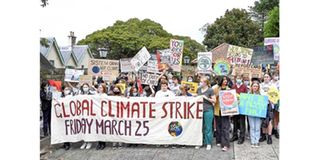CSW blueprint to promote women's participation in climate change

Schoolchildren shout slogans as they march towards the prime minister's house in Sydney on March 25, 2022, during a strike and protest by students highlighting inadequate progress to address climate change.
What you need to know:
- The UN Commission on Status of Women (CSW66) calls for full and equal participation and leadership in designing and implementing policies and programmes, to boost natural resource management.
- Countries will also be expected to expand gender-responsive finance in scale for climate and environmental action and to reach women’s organisations, enterprises and cooperatives.
The recently concluded 66th session of the UN Commission on Status of Women (CSW66) singled out the importance of incorporating women and girls as change agents in safeguarding the environment and addressing climate change.
In this regard, the conference, which came to a close on March 25, adopted a blueprint to promote women’s and girls’ participation in climate change, environmental and disaster risk reduction initiatives.
It calls on world leaders to promote their full and equal participation and leadership in designing and implementing relevant policies and programmes, to make natural resource management more effective.
Countries will also be expected to expand gender-responsive finance in scale for climate and environmental action and to reach women’s organisations, enterprises and cooperatives.
Resilience
Building women’s resilience to shocks in agricultural and food systems, forest and fisheries management and the sustainable energy transition will be another requirement for member states.
In addition, countries will enhance gender statistics and sex-disaggregated data in the gender-environment and foster just gender-responsive transitions.
UN Women Executive Director Sima Bahous said the agreements reached by the commission come at a point when the world urgently needs new and coherent solutions to the crises that affect every individual.
“We now have a pathway with practical, specific measures for global resilience and recovery, and a shared understanding that solutions depend on bringing women and girls to the centre. Let’s capitalise on the work done here, put these agreements into immediate practice and move these decisions forward through all the major forums ahead, including COP27,” said Ms Bahous.
CSW66 recognised with concern the disproportionate impacts of climate change, environmental degradation and disasters on women and girls that include loss of homes and livelihoods, water scarcity, destruction and damage to schools and health facilities.
Challenges
As a result of forced and prolonged displacement, women and girls face specific challenges, including separation from support networks, increased risk of all forms of violence, and reduced access to employment, education, and essential healthcare services, including sexual and reproductive healthcare services, and psychosocial support.
The commission stressed the urgency of eliminating persistent historical and structural inequalities, discriminatory laws and policies, negative social norms and gender stereotypes that perpetuate multiple and intersecting forms of discrimination.
The UN body called on the United Nations system, international financial institutions and multi-stakeholder platforms to continue supporting member states to achieve gender equality and the empowerment of all women and girls in the context of climate change, environmental and disaster risk reduction policies and programmes.
Participants observed the need to address the underlining barriers that exacerbate women’s and girls’ vulnerabilities in their social and economic status, safety, well-being and livelihoods.
The blueprint also emphasises that specific efforts must be made to amplify the voices and knowledge of marginalised women, including indigenous women, older women, women with disabilities, migrant women and those living in rural, remote, conflict and disaster-prone areas.
Their input must be heard and included in the management, conservation and sustainable use of natural resources and climate mitigation and adaptation initiatives and programmes.





